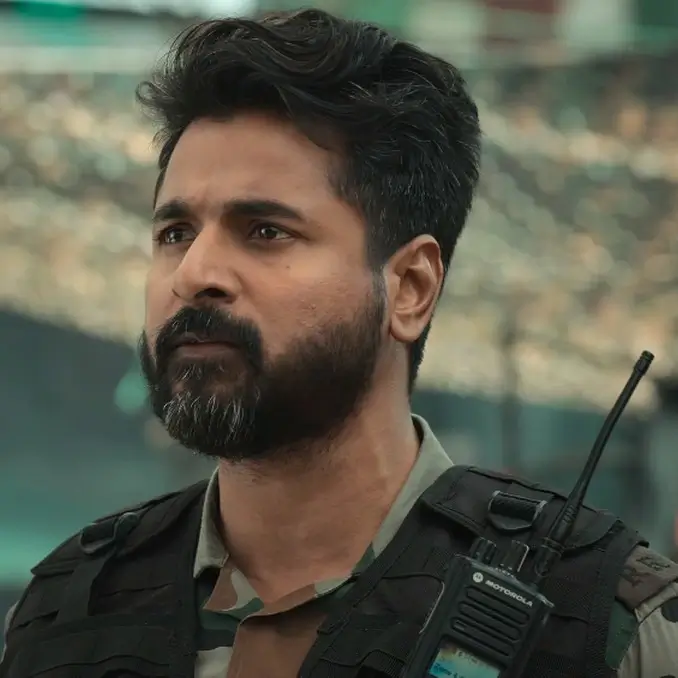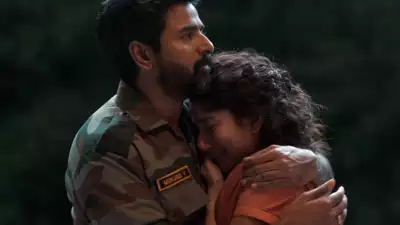While the realm of movies often explores the idea of heroism, when it explores the actual life of troops, it adds even more sensitivity and respect. One such movie doing precisely that is Amaran (2024), directed by Rajkumar Periasamy. This Tamil biographical play not only honors the great emotional trip left behind but also tells the courage of a soldier—Major Mukund Varadarajan. The film reflects poignantly the human aspect of conflict, sacrifice, and the legacy of bravery.
The Real Story Underlying the Movie Amaran
Major Mukund Varadarajan, a soldier who shown great bravery during his deployment in Kashmir in 2014, is at the core of Amaran As part of the counter-terrorism initiatives in the area, his last task saw him spearheading an operation to eradicate a well-known terrorist organization. Played by Sivakarthikeyan, Mukund pushes forward despite the risks and finally makes the ultimate sacrifice.
Drawing on actual events, the movie tracks Mukund’s personal and professional life. From his emotional relationship with his wife, Indhu (played by Sai Pallavi), to his friendship with his CAT (Counter-terrorism) squad mates, the story is full of action and very personal events. The movie finds a careful mix of poignant moments exploring the soldier’s psychology and brutal action scenes, therefore providing us with a glimpse of the mental and emotional toll such a life takes.
Amaran: More Than Only a War Film
At first glance, Amaran may seem as simply another fast-paced combat movie with troops battling terrorists. Deeper you go, however, and it is abundantly evident that it is much more than just The movie presents a genuine picture of the hardship of war, the sacrifices made, and the mental upheaval soldiers and their families go through rather than elevating combat.
Renowned for his adaptability, Sivakarthikeyan gives a brilliant performance as Major Mukund. He gives the character nuance that transcends the uniform and battlefield. Mukund is a spouse, a son-in–law, a team leader—not just a soldier. The intimate times when he spends time with his wife, Indhu, and the emotional complexity that accompany loving someone who may not be home at the end of the day show here. This is not the usual picture of a soldier; Mukund is genuine, vulnerable, and relevant.
The way Sai Pallavi presents Indhu gives the narrative a dimension of compassion. She continuously lives under the shadow of her husband’s risky work, therefore reflecting the emotional weight of being a military wife. Her subdued might and fortitude give the otherwise high-stakes story a human touch. Indhu’s sadness is obvious when disaster hits, but her stoic acceptance of the loss—as promised to her husband—adds even another level of depth to the drama.
AMARAN: The Horrible Climax for the Heart
Amaran develops into its emotional climax with the same intensity that reflects the tension of the operation Mukund and his crew are involved in. Major Mukund dies in a terrible terrorist confrontation in the latter phases of the movie. There is no usual heroic death when the protagonist passes away in a blaze of glory. Rather, Mukund passes away gently from a deadly injury as his team surrounds him. Not just for his colleagues but also for the audience, this is a time of intense loss.
His passing marks the end of the emotional ties spun over the movie, not just a story point. The way Mukund’s coworkers treat this occasion makes it extra tragic. They are losing a friend, a mentor, not just a colleague. It reminds one of the actual expenses of running a country. The movie does not hold back when depicting the terrible reality that even heroes could be snatched from us with great speed.
The movie veers gently but powerfully after Mukund’s death. Indhu shows great fortitude in the face of loss; she gets the Ashoka Chakra on behalf of her dead spouse despite her wounded heart. The last moments when she visits Mukund’s memorial—a site where his memory endures—amply accentuate the emotional intensity. The movie finishes with a feeling of completion but also a great, lingering melancholy as although the country honors its heroes, their families are forced to deal with the consequences of their sacrifice.
The Social and Political Context
The story of the movie is set against the background of Kashmir’s mounting conflict, with political upheaval and terrorist activities taking the stage. The movie gently addresses the larger geopolitical context, the difficulty of military operations, and the sacrifices troops make to guarantee the national security. It stays from being too political, however. It is thus generally relevant as it emphasizes the human side of the narrative.
Although there is obvious conflict in Kashmir throughout the film, what really distinguishes it is how it alters the lives of the individuals engaged. Though they are trained to battle, the soldiers are people experiencing the same feelings as everyone else. Something usually missed in conventional action movies, the movie shows this harmony of obligation and compassion.
AMARAN: Honoring Heroism and Selflessness
Amaran reminds us of the human aspect of soldiers’ duty in a society where they are often relegated to just figures of strength. The narrative of Major Mukund Varadarajan is one of bravery, certainly but also of fragility, love, and sacrifice. From his death, his legacy as seen in the movie goes beyond It’s a sobering reminder that families and loved ones of those who serve pay for the cost of freedom; the government or the military alone pays nothing for this.
Amaran honors every individual who has sacrificed their life for the greater good, not just regarding the life of a soldier. It honors the unsung heroes—those who battle for the people they love as much as for a flag. It also leaves us with a strong lesson: heroism is about the suffering, sacrifice, and emotional fortitude required to survive as much as about triumph.
Long after the last credits have rolled, this movie stays with you. It questions the definition of what it means to be a hero by demonstrating that, sometimes, the most heroic thing you can do is to live a life of love and service, knowing the cost may be much more than you could ever conceive. Amaran is, in every way, an homage to that kind of bravery.
The Amaran Story We Can All Connect To

Amaran presents a narrative that will appeal to you whether your taste is in military tales, biographies, or movies exploring the deep emotional undercurrents of life and sacrifice. The terrible but courageous journey of Major Mukund Varadarajan, whose legacy merits knowledge by every generation, comes to life in the great performances by Sivakarthikeyan and Sai Pallavi.
But Amaran reminds us of the emotional toll military duty has on people and their families, not just of conflict. Should you not yet view it, ensure you personally like the profundity of the movie.
Let’s keep the discussion going: How did you see Major Mukund’s life and sacrifice’s presentation? About the film’s controversies, how do you feel? Comment below your ideas, and let’s talk about the strong themes Amaran raises to light.
Stay tuned for additional updates, reviews, and study of the most recent movies causing stir in the business!

